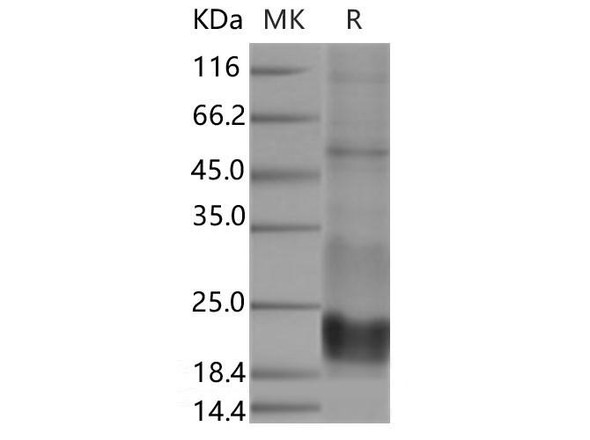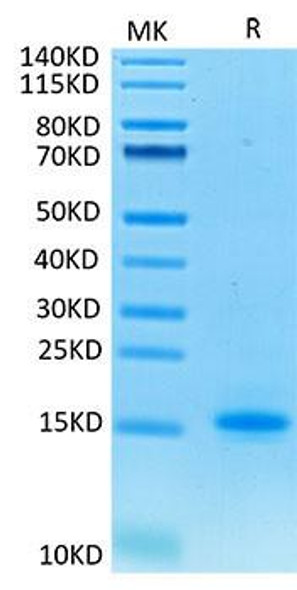Description
| Product Name: | Recombinant Human CD3 epsilon/CD3E (C-mFC) |
| Product Code: | RPES6221 |
| Size: | 10µg |
| Species: | Human |
| Expression Host: | HEK293 Cells |
| Synonyms: | T-Cell Surface Glycoprotein CD3 Epsilon Chain, T-Cell Surface Antigen T3/Leu-4 Epsilon Chain, CD3e, CD3E, T3E |
| Mol Mass: | 28.5 kDa |
| AP Mol Mass: | 32-40 kDa |
| Tag: | C-mFC |
| Purity: | > 95 % as determined by reducing SDS-PAGE. |
| Endotoxin Level: | < 1.0 EU per μg of the protein as determined by the LAL method. |
| Bio Activity: | Immobilized Human CD3E-mFc at 10μg/ml (100 μl/well) can bind Human Anti-CD3. The ED50 of Human CD3E-mFc is 9.4 ng/ml. |
| Sequence: | Gln22-Thr48 |
| Accession: | P07766 |
| Storage: | Generally, lyophilized proteins are stable for up to 12 months when stored at -20 to -80°C. Reconstituted protein solution can be stored at 4-8°C for 2-7 days. Aliquots of reconstituted samples are stable at < -20°C for 3 months. |
| Shipping: | This product is provided as lyophilized powder which is shipped with ice packs. |
| Formulation: | Lyophilized from a 0.2 μm filtered solution of PBS, pH 7.4. Normally 5 % - 8 % trehalose, mannitol and 0.01% Tween80 are added as protectants before lyophilization. Please refer to the specific buffer information in the printed manual. |
| Reconstitution: | Please refer to the printed manual for detailed information. |
| Background: | T-Cell Surface Glycoprotein CD3 ε Chain (CD3ε) is a single-pass type I membrane protein. CD3ε contains 1 Ig-like (immunoglobulin-like) domain and 1 ITAM domain. CD3ε is a polypeptide encoded by the CD3E gene on chromosome 11 in humans. The T cell receptor-CD3 complex (TCR/CD3 complex) is involved in T-cell development and several intracellular signal-transduction pathways. This complex is critical for T-cell development and function, and represents one of the most complex transmembrane receptors. The T cell receptor-CD3 complex is unique in having ten cytoplasmic immunoreceptor tyrosine-based activation motifs (ITAMs). TCR/CD3 complex plays an important role in coupling antigen recognition to several intracellular signal-transduction pathways. |






